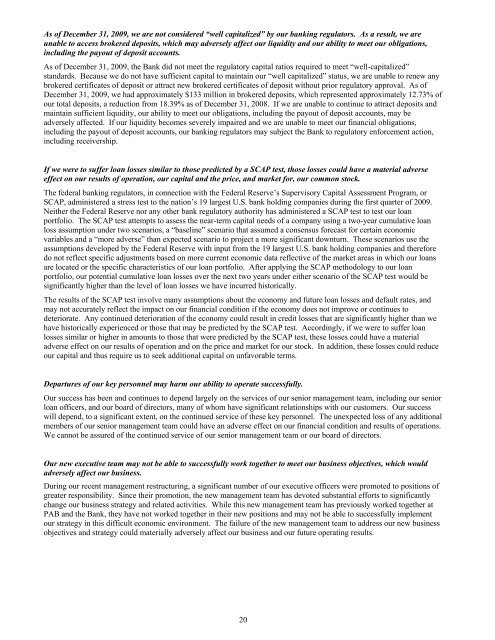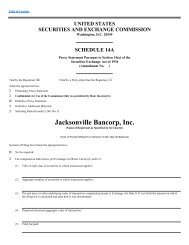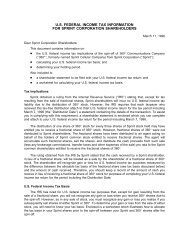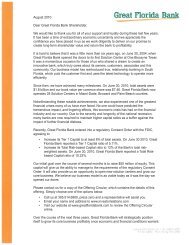pab bankshares, inc. - SNL Financial
pab bankshares, inc. - SNL Financial
pab bankshares, inc. - SNL Financial
You also want an ePaper? Increase the reach of your titles
YUMPU automatically turns print PDFs into web optimized ePapers that Google loves.
As of December 31, 2009, we are not considered “well capitalized” by our banking regulators. As a result, we are<br />
unable to access brokered deposits, which may adversely affect our liquidity and our ability to meet our obligations,<br />
<strong>inc</strong>luding the payout of deposit accounts.<br />
As of December 31, 2009, the Bank did not meet the regulatory capital ratios required to meet “well-capitalized”<br />
standards. Because we do not have sufficient capital to maintain our “well capitalized” status, we are unable to renew any<br />
brokered certificates of deposit or attract new brokered certificates of deposit without prior regulatory approval. As of<br />
December 31, 2009, we had approximately $133 million in brokered deposits, which represented approximately 12.73% of<br />
our total deposits, a reduction from 18.39% as of December 31, 2008. If we are unable to continue to attract deposits and<br />
maintain sufficient liquidity, our ability to meet our obligations, <strong>inc</strong>luding the payout of deposit accounts, may be<br />
adversely affected. If our liquidity becomes severely impaired and we are unable to meet our financial obligations,<br />
<strong>inc</strong>luding the payout of deposit accounts, our banking regulators may subject the Bank to regulatory enforcement action,<br />
<strong>inc</strong>luding receivership.<br />
If we were to suffer loan losses similar to those predicted by a SCAP test, those losses could have a material adverse<br />
effect on our results of operation, our capital and the price, and market for, our common stock.<br />
The federal banking regulators, in connection with the Federal Reserve’s Supervisory Capital Assessment Program, or<br />
SCAP, administered a stress test to the nation’s 19 largest U.S. bank holding companies during the first quarter of 2009.<br />
Neither the Federal Reserve nor any other bank regulatory authority has administered a SCAP test to test our loan<br />
portfolio. The SCAP test attempts to assess the near-term capital needs of a company using a two-year cumulative loan<br />
loss assumption under two scenarios, a “baseline” scenario that assumed a consensus forecast for certain economic<br />
variables and a “more adverse” than expected scenario to project a more significant downturn. These scenarios use the<br />
assumptions developed by the Federal Reserve with input from the 19 largest U.S. bank holding companies and therefore<br />
do not reflect specific adjustments based on more current economic data reflective of the market areas in which our loans<br />
are located or the specific characteristics of our loan portfolio. After applying the SCAP methodology to our loan<br />
portfolio, our potential cumulative loan losses over the next two years under either scenario of the SCAP test would be<br />
significantly higher than the level of loan losses we have <strong>inc</strong>urred historically.<br />
The results of the SCAP test involve many assumptions about the economy and future loan losses and default rates, and<br />
may not accurately reflect the impact on our financial condition if the economy does not improve or continues to<br />
deteriorate. Any continued deterioration of the economy could result in credit losses that are significantly higher than we<br />
have historically experienced or those that may be predicted by the SCAP test. Accordingly, if we were to suffer loan<br />
losses similar or higher in amounts to those that were predicted by the SCAP test, these losses could have a material<br />
adverse effect on our results of operation and on the price and market for our stock. In addition, these losses could reduce<br />
our capital and thus require us to seek additional capital on unfavorable terms.<br />
Departures of our key personnel may harm our ability to operate successfully.<br />
Our success has been and continues to depend largely on the services of our senior management team, <strong>inc</strong>luding our senior<br />
loan officers, and our board of directors, many of whom have significant relationships with our customers. Our success<br />
will depend, to a significant extent, on the continued service of these key personnel. The unexpected loss of any additional<br />
members of our senior management team could have an adverse effect on our financial condition and results of operations.<br />
We cannot be assured of the continued service of our senior management team or our board of directors.<br />
Our new executive team may not be able to successfully work together to meet our business objectives, which would<br />
adversely affect our business.<br />
During our recent management restructuring, a significant number of our executive officers were promoted to positions of<br />
greater responsibility. S<strong>inc</strong>e their promotion, the new management team has devoted substantial efforts to significantly<br />
change our business strategy and related activities. While this new management team has previously worked together at<br />
PAB and the Bank, they have not worked together in their new positions and may not be able to successfully implement<br />
our strategy in this difficult economic environment. The failure of the new management team to address our new business<br />
objectives and strategy could materially adversely affect our business and our future operating results.<br />
20
















